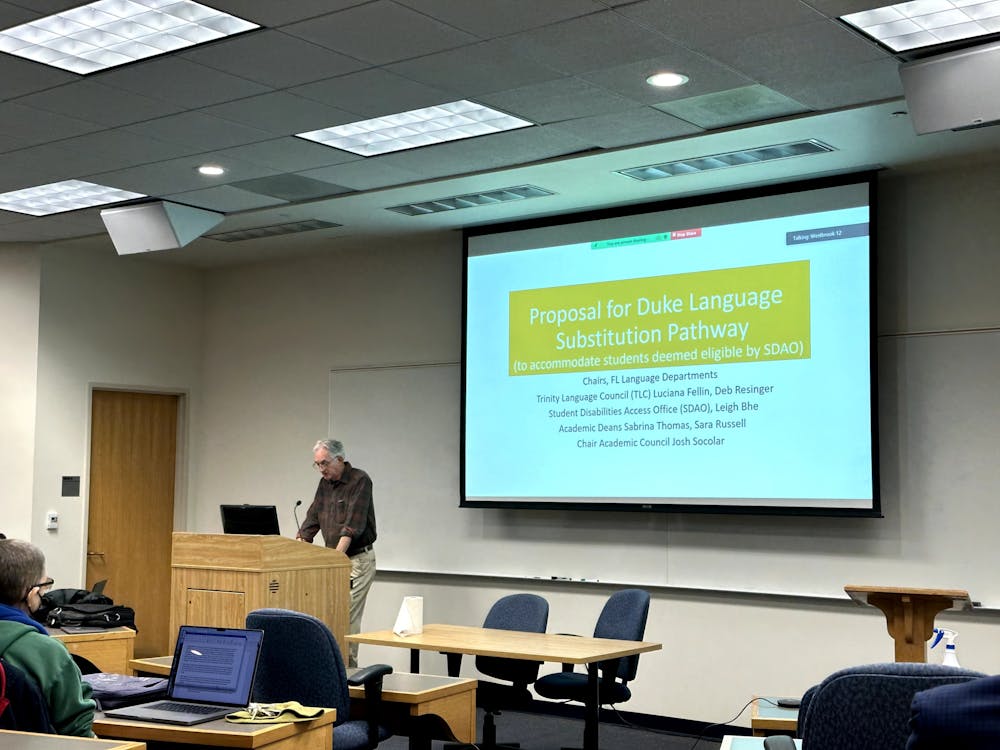The Arts & Sciences Council heard a proposal to alter the foreign language requirement for students with disabilities that prevent them from taking language classes on Thursday. It also heard from the Trinity College Office of Technology Services regarding Duke’s shift to Canvas from Sakai.
Professor of Physics Joshua Socolar, chair of the council, said that each year, there is a small number of students — around five — that have “extreme difficulty,” indicated by the Student Disability Access Office, in completing Trinity’s foreign language requirement.
He said that academic deans have been struggling to ensure these students fulfill the foreign language requirement while working around disability accommodations, as required by law.
“What is needed is an acceptable pathway for these students to fulfill their curricular requirements, which means that we have to define alternative requirements that we're calling foreign language substitution pathways,” he said.
Until now, Socolar said, some students with qualifying disabilities have been allowed to graduate without “technically fulfilling the curricular requirements” because to require them to do it was illegal or unreasonable.
Leadership of the Trinity Language Council worked with language department chairs and the SDAO office to develop such a pathway, which the Arts and Sciences Council will vote on at its next meeting.
The proposal on the table, presented by Luciana Fellin, professor of the practice of romance studies, allows students with “compounding difficulties” that prevent them from learning a foreign language to take three classes taught in English that explore “a new culture and language area.”
Foreign language departments that offer such classes are the German studies, Slavic and Eurasian studies and romance studies departments.
Fellin said that it is suggested that these students delve into coursework that encompass a single area or region, and should ideally be sequential. In exceptional cases, she said, students can take introductory courses in three different foreign language departments.
Study abroad experiences, provided they are related to a target language other than English, can count up to two of the required three credits. Transfer students eligible for this pathway can apply up to two credits before matriculation at Duke towards the requirement.
Faculty on the Council had mixed reactions to the proposal.
Alex Rosenberg, R. Taylor Cole distinguished professor of philosophy, was skeptical of whether the proposal was sufficiently in the spirit of the requirement. He said that knowing what the disabilities themselves were would help faculty understand the degree to which the proposal satisfies the requirement to the best of its ability.
According to Socolar, SDAO was “very reluctant” to provide examples of students who would qualify for the pathway, because the cases are all different and it doesn’t want to “give the impression that there is a particular theme” that needs to be addressed.
Faculty were also concerned that if the pathway is approved as a part of Trinity’s curriculum, the number of students requesting and receiving accommodations would increase.
Professor of Classical Studies Micaela Janan said that it should be made clearer that the pathway is for students who have disabilities that “prevent” them from learning a second language, and not simply “hinder” them.
“I just thought about the fact that it seems to open the door wider to anybody who has a difficulty learning a language,” she said.
Socolar said that students approved for this pathway must be certified as having a disability that prevents them from learning a second language by SDAO.
“The professional staff at SDAO make a determination and they don't accept all student requests,” Socolar said.
In other business
Edward Gomes, senior associate dean for Trinity College’s Office of Technology Services, provided an update to the Council about Duke’s shift to Canvas as its learning management system and a presentation about endpoint management software.
The shift to a new learning management system will start in the fall of 2023, when faculty will be able to opt into Canvas. By fall of 2024, according to Gomes, all courses will be on Canvas by default. Sakai will be around for some period after Canvas becomes the default.
“This is something that we really do need to do. We've been on this system for a long time. Ten years,” Gomes said. “We are one of the last of our peers to move off of Sakai onto some other platform.”
Currently, the Fuqua School of Business and the School of Medicine both use Canvas as their learning management system.
Get The Chronicle straight to your inbox
Signup for our weekly newsletter. Cancel at any time.

Adway S. Wadekar is a Trinity junior and former news editor of The Chronicle's 119th volume.

